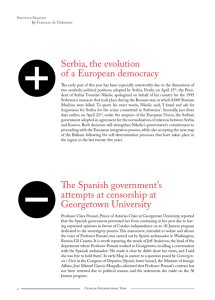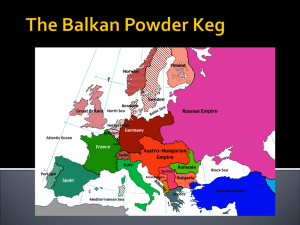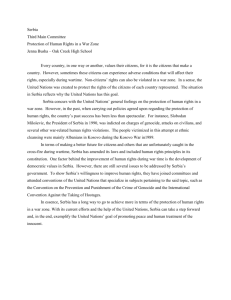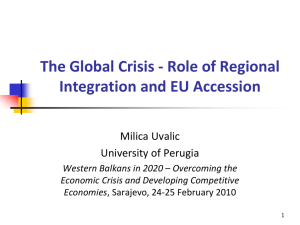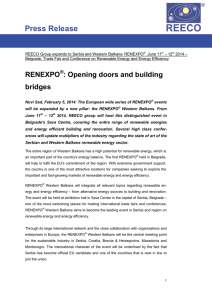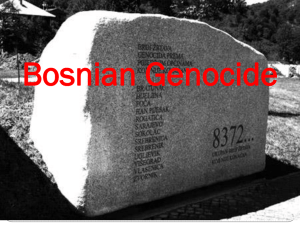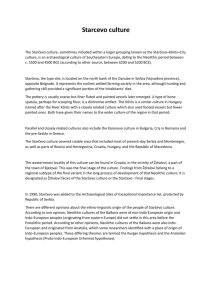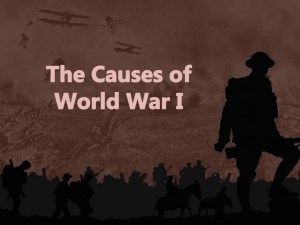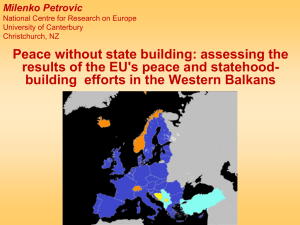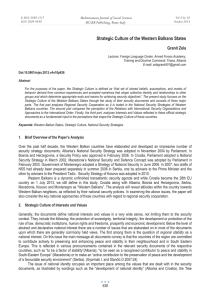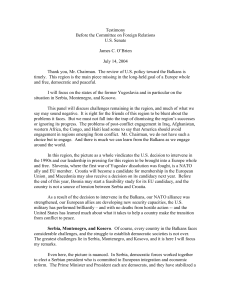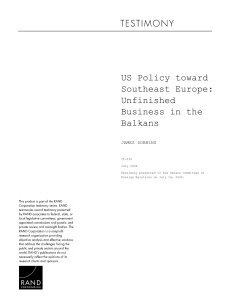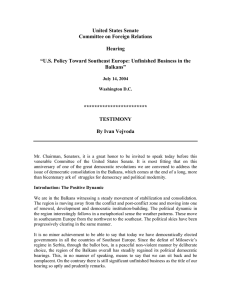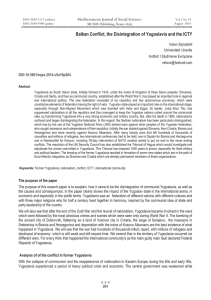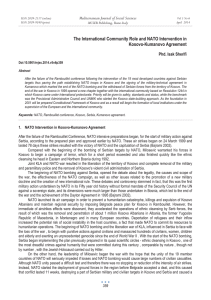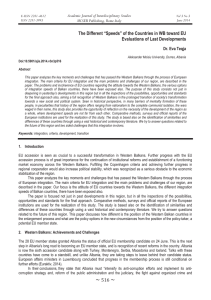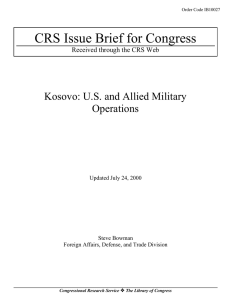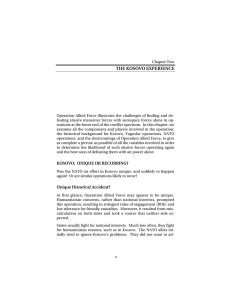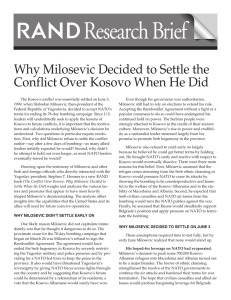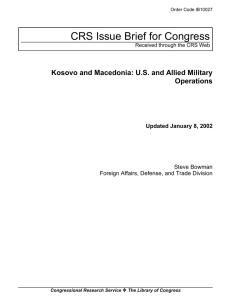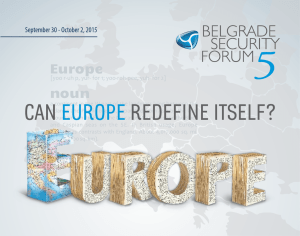Senator Joseph R. Biden, Jr. Opening Statement
advertisement
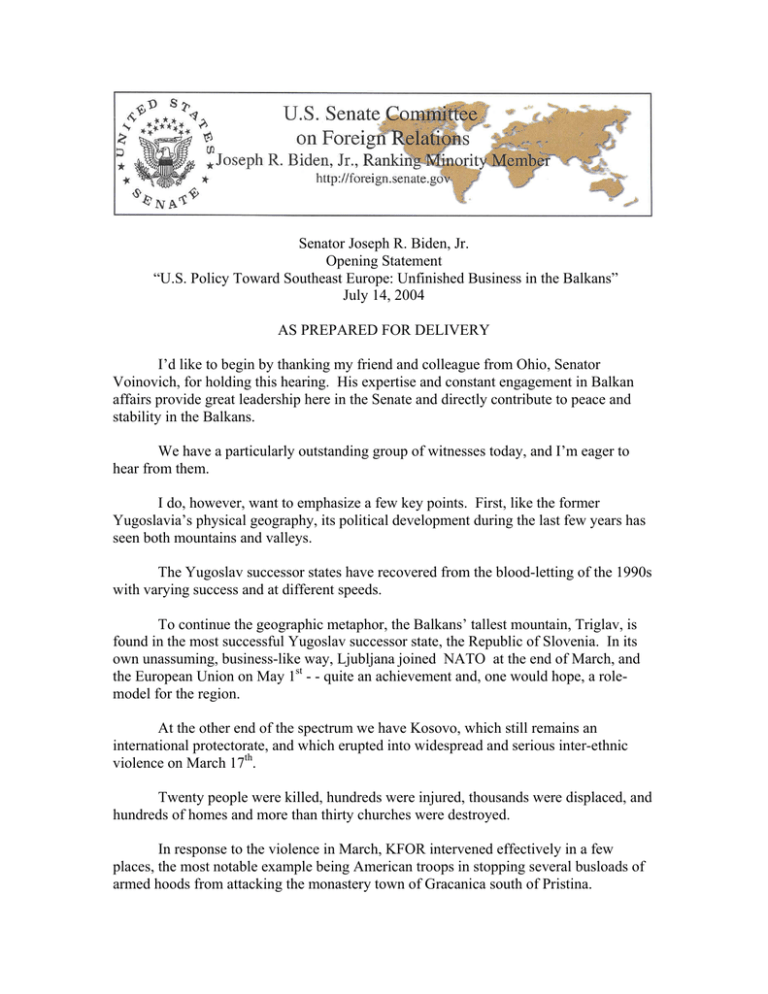
Senator Joseph R. Biden, Jr. Opening Statement “U.S. Policy Toward Southeast Europe: Unfinished Business in the Balkans” July 14, 2004 AS PREPARED FOR DELIVERY I’d like to begin by thanking my friend and colleague from Ohio, Senator Voinovich, for holding this hearing. His expertise and constant engagement in Balkan affairs provide great leadership here in the Senate and directly contribute to peace and stability in the Balkans. We have a particularly outstanding group of witnesses today, and I’m eager to hear from them. I do, however, want to emphasize a few key points. First, like the former Yugoslavia’s physical geography, its political development during the last few years has seen both mountains and valleys. The Yugoslav successor states have recovered from the blood-letting of the 1990s with varying success and at different speeds. To continue the geographic metaphor, the Balkans’ tallest mountain, Triglav, is found in the most successful Yugoslav successor state, the Republic of Slovenia. In its own unassuming, business-like way, Ljubljana joined NATO at the end of March, and the European Union on May 1st - - quite an achievement and, one would hope, a rolemodel for the region. At the other end of the spectrum we have Kosovo, which still remains an international protectorate, and which erupted into widespread and serious inter-ethnic violence on March 17th. Twenty people were killed, hundreds were injured, thousands were displaced, and hundreds of homes and more than thirty churches were destroyed. In response to the violence in March, KFOR intervened effectively in a few places, the most notable example being American troops in stopping several busloads of armed hoods from attacking the monastery town of Gracanica south of Pristina. 2 But in other areas European KFOR troops stood aside while rioters burned down churches and homes. The violence was ugly. It was inexcusable. It was avoidable. And it must never reoccur. Unfortunately, it is difficult to be confident that it will not. The United Nations Mission in Kosovo, UNMIK, now has a new head and is attempting to streamline the overly ambitious benchmarks it had previously set as a precondition for discussion of the final status of the province. But Progress remains slow and mutual distrust remains intense. The neighboring Former Yugoslav Republic of Macedonia suffered a terrible loss last winter when its highly respected President, Boris Trajkovski, was killed in a plane crash. The new President and the current prime minister -- who heads a coalition of ethnic Macedonian Slav and ethnic Albanian parties -- are trying to implement the agreement that ended a civil war in 2001. Decentralization and reform of local government is the key, and success will be difficult. Elsewhere, the picture is somewhat more hopeful. Croatia is making steady progress toward accession to the European Union. As part of this, Zagreb has been cooperating with the International Criminal Tribunal for the Former Yugoslavia, as evidenced by its decision to send a former Croatian general to The Hague to face war crimes charges against Serb civilians. That’s encouraging. But Croatia still has work to do by apprehending and extraditing another prominent war crimes indictee, General Ante Gotovina. A similar situation exists in Serbia and Montenegro, where failure to cooperate with The Hague continues to stifle progress toward membership in NATO’s Partnership for Peace, and eventually in NATO itself and in the EU. Efforts to send former Bosnian Serb General Ratko Mladic to face war crime charges have been thwarted consistently, and four indicted Serbian generals remain free. Despite this ongoing lack of cooperation, there have been significant signs of progress. On June 27th the Serbian people elected Boris Tadic, former Defense Minister and a committed democratic reformer, as their President. I met with Mr. Tadic at the end of April here in Washington. He is a most impressive man - - just the kind of democrat Serbia needs. 3 I congratulate Mr. Tadic on his election and urge him to use the prestige of his new office to continue reform efforts in order to bring Serbia into European and transAtlantic institutions. A word is in order on the other part of the Union of Serbia and Montenegro. This “marriage” was largely forced upon Montenegro by the European Union, with the Bush Administration opting out of the process. Whatever the ostensible rationale was for the creation of the union, it does not seem to have worked. Late last month Serbia’s most respected economist said publicly that the economies of the two countries have been unable to merge. Montenegrin Prime Minister Djukanovic - - another Balkan leader with whom I have met several times - - is an ardent champion of independence for his country. The electorate is divided on the issue, with the most likely result of a referendum a slim majority for independence. I will be interested the opinions of our distinguished witnesses on this and other delicate issues. The bloodiest of the Wars of the Yugoslav Succession in the 1990’s occurred in Bosnia and Herzegovina. I met in June with Bosnian Prime Minister Terzic, to congratulate him on his country’s painful but significant progress toward stability. But, as in Serbia, that progress and integration into Western institutions will be incomplete as long as Radovan Karadzic remains free in the Republika Srpska. I have no doubt of the complexity and delicacy of locating and arresting persons indicted for war crimes. But it will be absolutely impossible for Bosnia and Herzegovina to move forward until Karadzic is in The Hague. My only advice to the Administration on this matter is simply not to even consider any compromise. Both of these gentlemen must be apprehended, without conditions, and sent to The Hague. I will conclude with two general observations. First, in order for us to take the battle to the terrorists in Central Asia and the Middle East, we must have a stable Europe. In other words, the stability of Europe is essential for the security of the United States. However, even as NATO and the European Union have expanded to an extent that a few short years ago we thought inconceivable, it is clear that Europe will not be 4 fully stable until its southeastern corner is stable. The riots in Kosovo in March prove that violence remains a reality in some areas, and a real threat in others. Last, let me point out that the United States - - because of our leadership in the Bosnian air campaign of 1995, in the Dayton Peace Accords after the fighting stopped, in the campaign to stop ethnic cleansing in Kosovo in 1999, and the resulting credibility that we have with all ethnic groups in the region - - remains the critical player in the area of the former Yugoslavia. Since SFOR will end its mission this December, and be succeeded by a European Union force, we must ensure a continuing role for the United States – not because we want or need to call the shots there or elsewhere – but because in our absence, we run the risk of destabilizing a fragile piece of strategically important real estate. Despite the enormous strains on our military, given our commitments in Iraq, Afghanistan, and elsewhere we must remain present in the Balkans in order to maintain the course toward peace, inter-ethnic stability, and democracy. Thank you again, Mr. Chairman. I look forward to hearing from our distinguished witnesses. # # #
